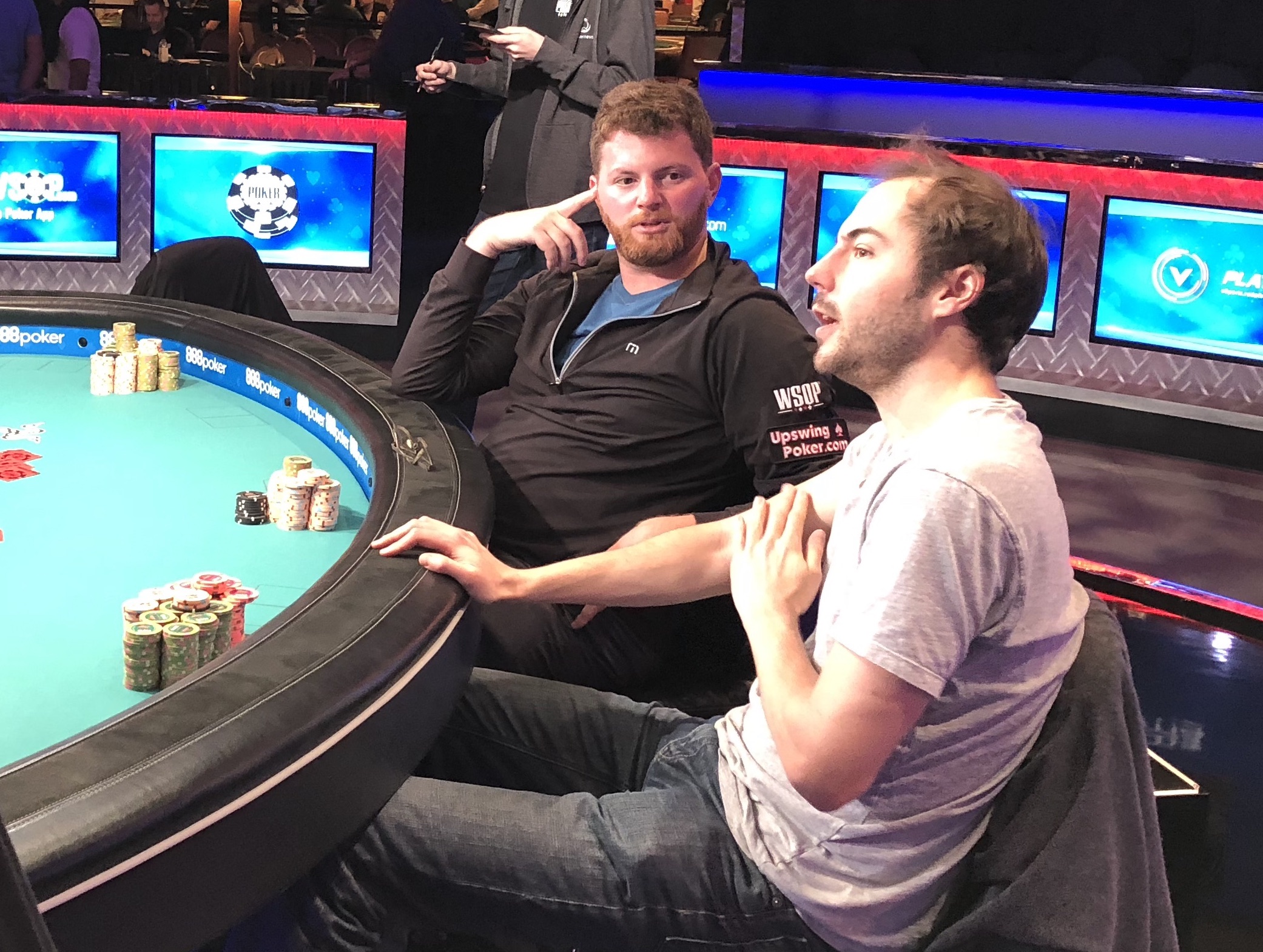Apparently disinterested in crowning a legitimate champion in the $100,000 NLH WSOP High Roller on Tuesday, Elio Fox and Nick Petrangelo made a side deal away from the table to the dismay of many fans who didn’t enjoy seeing a multimillion-dollar bracelet winner determined by blind raises and three-bets during heads-up play.

Some poker fans watching on PokerGo took to social media accusing the players of making a mockery of what the WSOP was promoting as “one of the most prestigious events” on the 2018 schedule. Still others, including CardsChat pro Ryan Laplante, argued that these sorts of deals are simply part of the game, especially when the money is worth more than a bracelet.
With 105 entrants and Player of the Year implications also at stake, the inaugural WSOP $100K High Roller showed how controversial chops can be with big money in the balance and individual players having their own personal motivations for whether or not to make a deal.
Petrangelo, the 6th place finisher in last week’s $300,000 buy-in Super High Roller Bowl, was fighting for his second WSOP bracelet. His first came in 2015, when he took down a $3,000 NLH Shootout ($201,812). Fox was playing for his third — he won the 2011 WSOP Europe main event for €1.4 million — but also his second in less than a week, after winning the $10,000 NLH Super Turbo Bounty on Thursday for $393,693.)
Art of a Deal?
Heads-up began with both players seeming to give it their all. Petrangelo started with a better than 3:1 chip advantage, but Fox dutifully whittled away and eventually took a slight chip lead. With the players holding nearly identical stacks, both with more than 90 big blinds, the incentive to chop had arisen.
On a short break, the two met on the rail to converse with fellow high-stakes grinder Stephen Chidwick, who also made the final table but had busted out in 6th place ($484,551) a few hours earlier.
With two left, both players were guaranteed nearly $1.8 million, with the winner slated to receive $2.9 million and the bracelet. Neither player publicly declared the terms of their deal, but it quickly became clear that something was up.
When the players returned to the table, they were discussing how to bring the match to its quickest end. To speed up the action, as viewers on the PokerGo livestream could hear, they agreed to a forced blind min-raise from the button, followed by a forced blind three-bet. If you were watching and didn’t know what was going on, you might have assumed Petangelo and Fox, two established pros with more than $3.5 million in tournament winnings between them, were playing poker for the first time.
After seeing a flop, the seemed to play the hands normally, but took very little time to consider their decisions. (This tournament was the first WSOP bracelet event to use a 30-second shot clock.)
Under the Table, Not Dreaming
The WSOP frowns upon chopping but can’t do anything to prevent players from making side deals away from the table. But by refusing to facilitate chops, situations like Monday arise where viewers are forced to watch an arguably bogus heads-up match.
PokerGo commentator Ali Nejad, for one, voiced his displeasure with two players devaluing a WSOP bracelet.
I tell you, Elio Fox, already having won a first bracelet, would have been well-served to fight for a second bracelet here,” Ali Nejad said as the PokerGo livestream concluded. “He has Player of the Year purposes.”
CardsChat ambassador and 2016 bracelet winner Ryan Laplante wasn’t the only poker pro who defended the players’ decision to make a side deal, and he had a suggestion for the WSOP on how to ensure poker fans don’t witness impure bracelet events.
The @WSOP needs to facilitate dealmaking.
With no true rules in place it allows people to get exploited.
If you have set rules in place that allows it, and leaves some to play for, then situations like this wont occur.
Also have some flexibility Headsup for lvls/etc…
— Ryan Laplante🏳️🌈 (@Protentialmn) June 5, 2018
Three-time bracelet winner Dutch Boyd, however, took an opposing view in responding to Laplante’s tweet, saying, “it’s terrible for the game” if players are “found to be making deals under the table.”
Many viewers voiced displeasure with the chop on PokerGo’s Twitter page. One commenter suggested the “poker gods” would one day “punish this mockery.” Poker fan David Ward summed up this view even more critically.
https://twitter.com/NoLimitCeltic/status/1003805088912232450
Player of the Year Implications
In the end, Petrangelo “won” the bracelet, preventing Fox from becoming one of the earliest two-time winners in WSOP history. It’s too early to start projecting a POY winner, but with Fox having already won a bracelet, had he scooped the $100k, he instantly would have become the clear-cut favorite and player to catch.
(In 2016, Jason Mercier won two bracelets over an eight-day stretch, with a runner-up finish sandwiched in between, en route to an eventual POY banner in the Rio.)
Official Final Table Results
1st: Nick Petrangelo $2,910,227
2nd: Elio Fox $1,798,568
3rd: Aymon Hata $1,247,230
4th: Andreas Eiler $886,793
5th: Bryn Kenney $646,927
6th: Stephen Chidwick $484,551
To be sure, Petrangelo and Fox weren’t intentionally losing. They simply agreed to speed up the action, which turned the heads-up contest into a turbo match, essentially minimizing the skill factor and irritating many poker fans. But a last man standing wasn’t pre-determined. The cards had their final say.
In the official winners photo, Petrangelo is posing with his bracelet, winning two cards face down, with both Fox and Chidwick standing behind him smiling.


